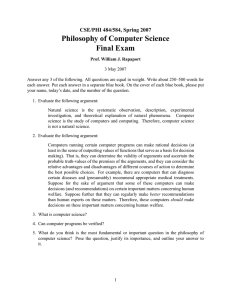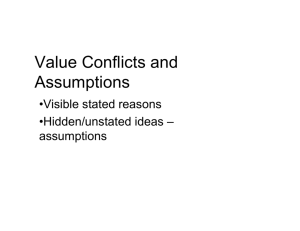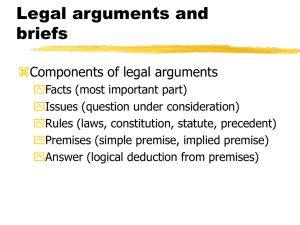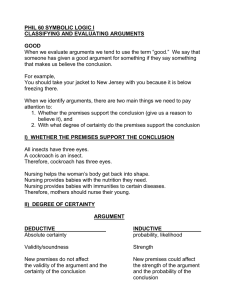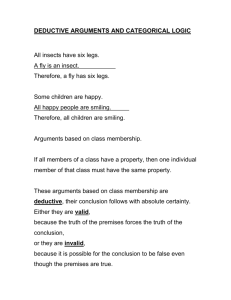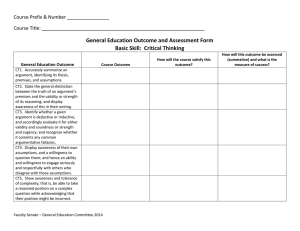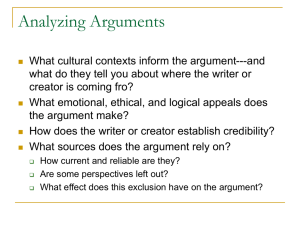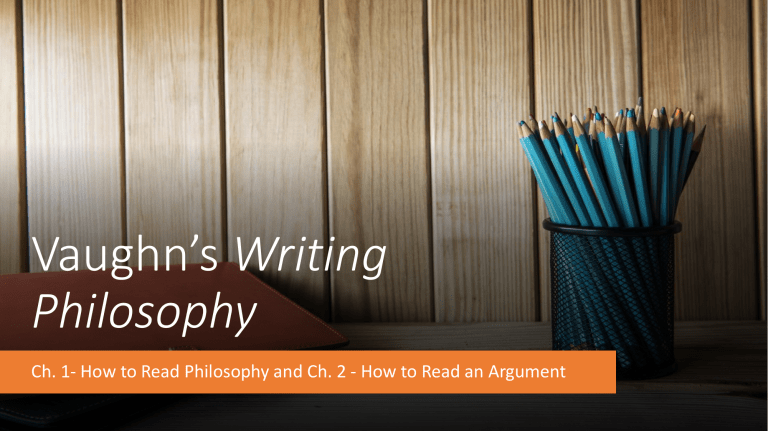
Vaughn’s Writing Philosophy Ch. 1- How to Read Philosophy and Ch. 2 - How to Read an Argument Vaughn’s Aim • The full title of the book is Writing Philosophy - A Student's Guide to Writing Philosophy Essays • The title expressed that aim: to guide students in writing philosophy essays • The first two chapters are about laying fundamental principles and competencies towards that aim Chapter 1 sections • What is Philosophy ❖Divisions of Philosophy (Metaphysics, Axiology, Epistemology, Logic) • Reading Philosophy ❖Rule 1-1 Approach the Text with an Open Mind ❖Rule 1-2 Read Actively and Critically ❖Rule 1-3 Identify the Conclusion First, then the Premises ❖Rule 1-4 Outline, Paraphrase, or Summarize the Argument ❖Rule 1-5 Evaluate the Argument and Formulate a Tentative Judgment • Writing a Paraphrase or Summary • Applying the Rules • Premises and Conclusions Chapter 2 sections • Judging Arguments ❖Rule 2-1 Know the Basics of Deductive and Inductive Arguments ❖Rule 2-2 Determine whether the Conclusion follows from the Premises ❖Rule 2-3 Determine whether the Premises are True • Applying the Rules What is Philosophy “[I]t is a discipline, a field of inquiry. It is concerned with the examination of beliefs of the most fundamental kind--beliefs that structure our lives, shape our worldviews, and underpin all academic disciplines. . . . “It focuses on whether a belief is worth believing.” What is Philosophy “More than anything else, philosophy is a process, a careful. systematic investigation of fundamental beliefs. . . To put it more precisely, doing philosophy consists mainly of the systematic use of critical reasoning to explore answers to basic questions, to clarify the meaning of concepts, and to formulate or evaluate logical arguments.” What is Philosophy The broad sense refers to the systematic use of critical reasoning to evaluate beliefs. The narrow sense pertains to one’s worldview or perspective. Main Divisions of Philosophy • Metaphysics – “What is real?” “What does ‘to exist’ mean?” • Axiology (Ethics) – “How must we live our lives?” “What makes a right action, right?” • Epistemology – “What is truth?” “What is knowledge?” “How do we know that we know?” • Logic – “What is correct reasoning?” Reading Philosophy Rule 1-1 Approach the Text with an Open Mind Do not prejudge the text or the author of the text: listen carefully to what is being conveyed Rule 1-2 Read Actively and Critically You do not only intend to understand what is being conveyed, but more importantly, to evaluate the validity of what is being claimed. Ask yourself: what is the main point that is being made by the text? How is that point supported? Rule 1-3 Identify the Conclusion First, then the Premises Rule 1-4 Outline, Paraphrase, or Summarize the Argument Re-state the argument, i.e., main point and the evidence of the text, “your way.” Rule 1-5 Evaluate the Argument & Formulate a Tentative Judgment Do not just regurgitate what you have read; assess intelligently whether it is worth believing in or not. Paraphrasing and Summarizing Statements and Claims “A statement, or claim, is an assertion that something is or is not the case. It is the kind of utterance that is either true or false.” Premises and Conclusions “An argument is a combination of statements in which some of them are intended to support another one of them. That is, in an argument, some statements are intended to provide reasons for believing that another statement is true. The statements supposedly providing the support are known as premises; the statement being supported is known as the conclusion.” Judging Arguments This is an amplification of Rule 1-5 Evaluate the Argument & Formulate a Tentative Judgment. Rule 2-1 Know the Basics of Deductive and Inductive Arguments “Deductive arguments are supposed to offer logically conclusive support for their conclusions.” They argue from general premises to particular conclusions and can either be valid or invalid. “[I]nductive arguments are meant to provide probable support for their conclusions.” They argue from particular instances towards a general law, and can either be strong or weak. Good arguments must be well reasoned and have true premises. . . A valid deductive argument with true premises is said to be sound. A strong inductive argument with true premises is said to be cogent. Valid arguments can still be false, that is, they can be formally valid but materially false. Consider this example: All philosophy teachers are welltravelled. Dr. Lagdameo is a philosophy teacher. Therefore, Dr. Lagdameo is welltravelled. [I wish!] Rule 2-2 Determine whether the Conclusion follows from the Premises In hypothetical arguments, either of their premises are affirmed or denied. This affirmation or denial is the conclusion of the argument. Modus ponens – the antecedent part of the first premise is affirmed If p, then q. p therefore, q. Rule 2-2 Determine whether the Conclusion follows from the Premises In hypothetical arguments, either of their premises are affirmed or denied. This affirmation or denial is the conclusion of the argument. Modus tollens – the consequent part of the first premise is denied If p, then q. not q therefore, not p. Rule 2-2 Determine whether the Conclusion follows from the Premises In hypothetical syllogisms, the pattern is as follows: If p, then q. If q, then r. Therefore, if p, then r. Rule 2-2 Determine whether the Conclusion follows from the Premises Rule 2-2 Determine whether the Conclusion follows from the Premises Examples: Invalid Conditional Arguments Denying the antecedent If my teacher moves the deadline, s/he is considerate. S/he did not move the deadline. Therefore, my teacher is not considerate. Affirming the consequent If someone is a communist, s/he is a critic of the government. Ateneans are critics of the government. Therefore, Ateneans are communists. Common Forms: Inductive Arguments • Enumerative = the greater the number and the better the representation, the stronger the argument • Analogical = the more relevant the similarities, the more probable the claim • Inference to the best explanation = “at the heart of scientific explanations,” most likely to be true – principles of conservatism and simplicity “Ockham’s razor” Rule 2-3 Determine whether the Premises are True As readers, we are tasked to carefully evaluate the truth of all premises and the support behind them. We need to fact-check, therefore. Consider this argument: Sinovac vaccines have a lower level of efficacy than other vaccines and are more expensive. And yet, the Duterte Administration is bent on acquiring and using them. This shows that Duterte is pro-China.
